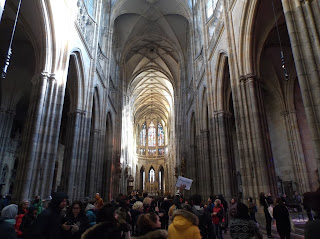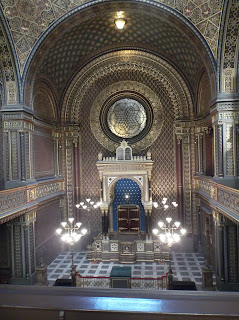I caught the overnight train from Keleti Station in Budapest, arriving in Prague at 6:30am on the Saturday. As the train sidled towards Prague station I had a dramatic view of the city, which was something like this (I was too slow to get a picture myself):
My first thought was, "Wow, this is really beautiful." My second was, "Wow, it's dirty." Making my way to the conference via the scenic route, I saw a fair bit to confirm my initial impression. There are beautifully painted buildings of the sort that you simply do not see in Budapest - but there seems to be far less pride taken in it. The shops on the ground floors of grand facades make no attempt to blend in, and there's graffiti everywhere (including on the Czech parliament building!).
The other thing is that not everything is as elegant as these highlights. The Vltava - at least as it appeared that morning - was a dull river bounded by sheer concrete. One could hardly imagine travelling down it for leisure.
It should be noted that it was overcast, weather which does not portray the city ideally. Furthermore, I was short on sleep from having struggled to grab even twenty winks on the train as it stopped and started its way through Slovakia and the Czech Republic. So perhaps this was something of an unfair judgement.
 |
| A typically well-decorated building, ruined by the shops on the ground floor. |
The next talk I went to was much more interesting: a defence of Marx. To be clear, this was an ex-Marxist who was playing devil's advocate, and it focused only upon Marx's theory of historical progression. That said, it was a useful session which filled in a couple of the gaps that existed in my understanding of Marxist theory.
After this, there was lunch. All meals at the conference were provided, with the cost being included in the ticket price. Unsurprisingly there were long queues waiting to be served food, and the vegetarian food ran out quickly. You'd have thought that of all people, libertarians would realise that central provision of food at below-market price inevitably leads to queues and starvation.
Immediately following lunch there was a keynote speech on the subject of noticing and responding to surveillance. I arrived a bit late, got a bad seat, and couldn't really hear it. In the mid-afternoon there were a range of activities. Ever the political philosophy nerd, I went to a discussion of the link between religion and politics. I can't say it was very high quality; that said, it was probably no worse than the average undergraduate seminar. Other events included a gun-shooting session, because this was a libertarian conference and if there's one thing we like more than freedom, it's making use of that freedom in ways that annoy people.
I have no idea what I did following this. In any case, for the final session of the day I went to a talk given by Edward Stringham presenting some of the stuff from his book on how markets can exist even in the absence of government courts and regulation. It was much more strident than his appearance on EconTalk.
At this point there were a couple of hours going spare, so I went to the Easter Market in the Old Town Square. There was some traditional music and dance being performed, which made me nostalgic for the weekends I used to spend at IVFDF.
In the evening there was a thing going on at a club which had the enviable location of being in the middle of the Vltava. There was a good band playing live, we each got a free drink, and I had a couple of interesting conversations - one with a couple of guys from the other end of the Czech Republic, and one with Edward Stringham and with a girl from the Faroe Islands.
On Sunday morning, there was once again breakfast and I was able to have a conversation (along with three or four other students) with Bob Murphy. I can confirm that his unhealthy obsession with Paul Krugman is as present in real life as it is on the internet.
The first session I went to was one on the ancient Brehon law of Ireland, back in the days before England imposed a state on them. The talk was given by one Kevin Flanagan Coombes, whom you may guess from the name was himself Irish. Indeed half the talk seemed to be talking about how much the Irish were known for their love of justice. That said, there were some fascinating claims that I'd love to see made in a medium that people are more inclined to trust. These ranged from facts about the law (e.g. if a stranger arrived in an area, you were legally required to provide hospitality. This facilitated trade, and explains why the Irish are so friendly: because they would have been punished if they weren't) to its applications (e.g. apparently many tribes across the world who lack a written record of their laws have essentially adopted Brehon law, as they have judged it to be sufficiently similar to their own law to be indistinguishable). If half of these are true, it would greatly affect the way we think about law. Unfortunately, based upon some of his rather murky exegesis of the philosophy of law, I am not convinced that Mr. Flanagan Coombes is the best person to draw out these implications.
I didn't go to a second session, since none of them looked interesting. Instead I got my Kindle and read for a bit. Finally, the conference was closed by a talk given by Tom Palmer on students who had achieved great things for liberty. I didn't really real comfortable in the talk, it seemed very self-congratulatory to listen to a man talk about how we were all awesome and could change the world.
After scrounging as much as I could from what was left over from breakfast, I set out to make the most of the portion of the day which was left. Having not especially enjoyed the first day-and-a-half of my stay, I was determined not to waste the remaining two days.
There wasn't really time to go very far, so I had a look around the Jewish museum. The main museum wasn't very big, and the most interesting exhibit was a touchscreen which told the history of Jews in various places across Bohemia. The numbers of Jewish families seemed to be very variable, presumably due to the perpetual threat of Pogroms.
The museum closed before I had a chance to visit any of the synagogues, although fortunately the ticket was good for several days. Instead I went to have a look at the Powder Tower.
The next day I woke up bright and early in order to see Prague Castle. The weather had picked up very pleasantly, and on my way past the Astronomical Clock (I was staying at a hostel perhaps 100m away from it - the Prague Square Hostel, highly recommended) I was able to get this snap:
I took more photos on the way. This one should both show the grandeur of the castle, and the grimness of the river:
I spent the morning going round the castle. I don't have many photos due to the camera policies in there, but most of it wasn't especially visually interesting. There were some interesting stories - a defenestrated minister here, an enterprising artillery company there - but the bits I remember most strongly are the basilica and the Golden Lane.
 |
| Pictures of the basilica. |
 |
| Pictures of Prague from the castle. |
In the evening I went to a concert given in one of the churches by an organist and a small string orchestra. Hearing Bach on a proper organ is always a delight, and it was almost enough to let me forget how overpriced it was (at least compared to what I'm used to). Indeed, Prague in general is ridiculously expensive - more pricey than Manchester, more than twice as expensive as Budapest.
This was my final evening in Prague, which meant that it was a good time to visit the Prague Beer Museum. It's called a museum but it's really a pub with an unusually wide range of beers. Nevertheless, I was able to get a set of five contrasting beers, in small glasses of 150ml each.
 |
| #SquadGoals |
To be honest I wasn't massively keen on most of them. A couple were somewhat experimental beers that didn't quite work out, but that's fine. Another was a bitter that, given a few years, I am sure I will mature into. The one I did enjoy was the one at the end, which was very light and a welcome relief from the previous beers, which had got steadily heavier.
After another good night's sleep, I made my way to the Kafka Museum. On the way I walked across the Charles Bridge, which remains a highlight of the journey. That's one thing which Budapest simply has no equivalent to. I have photos, but because I forgot my camera and instead used my phone they're potato quality:
Outside the museum was a somewhat obscene statue of two men urinating into the Czech Republic. Perhaps it was artistic; it was definitely crude. Their waists were moving from side to side, so that the streams of water were constantly moving.
Photos were prohibited within the actual museum. All I can say is that it gave a very good impression of the twisted, dystopian aesthetic of which Kafka was perhaps the greatest promulgator, and that I cam away knowing rather more of Kafka than I did when I went in.
After picking up my bags from the hostel, I went to the Antonin Dvorak museum. This is a modest museum, set in a single small building not far from the train station. It was by far the best value thing I did while there, at 30Kr (about £1) for entry.
After this I made my way to the train station and caught a train back to Budapest. Overall I'm happy to have gone to Prague, but will be quite happy if I never go again. If you want to experience the Central European aesthetic then there are far cheaper places to do so; Prague is arguably most exquisite than Budapest, though, and is undoubtedly far more walkable.
If you want to go to a Central European city for a stag weekend, please go to Prague and not Budapest. (a) It has better nightlife, and (b) you've already ruined bits of Prague. Please don't bring Budapest down to that level of tackiness.
If you want to go to a Central European city for a stag weekend, please go to Prague and not Budapest. (a) It has better nightlife, and (b) you've already ruined bits of Prague. Please don't bring Budapest down to that level of tackiness.




















No comments:
Post a Comment